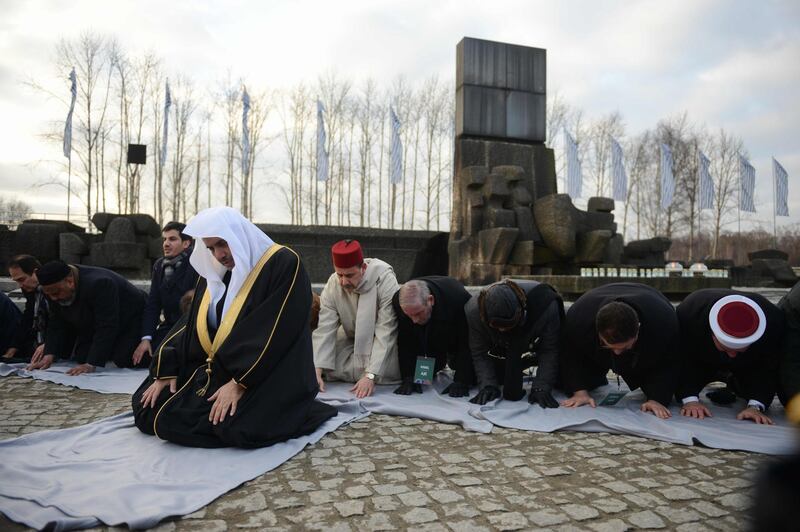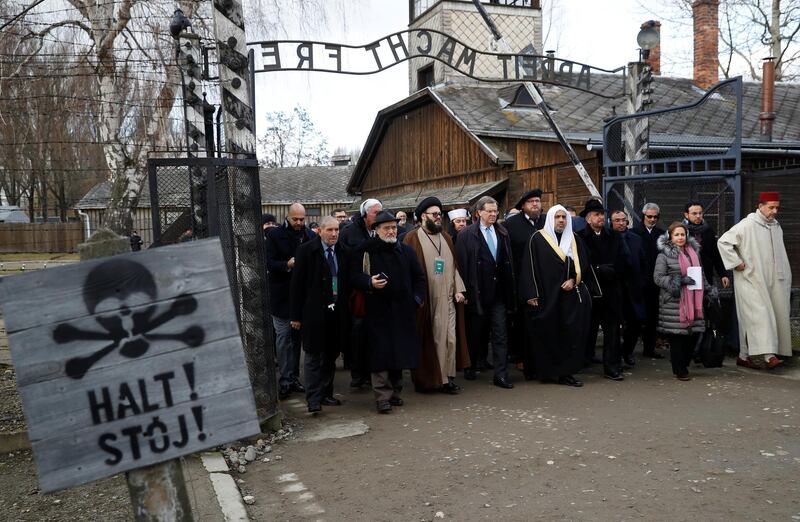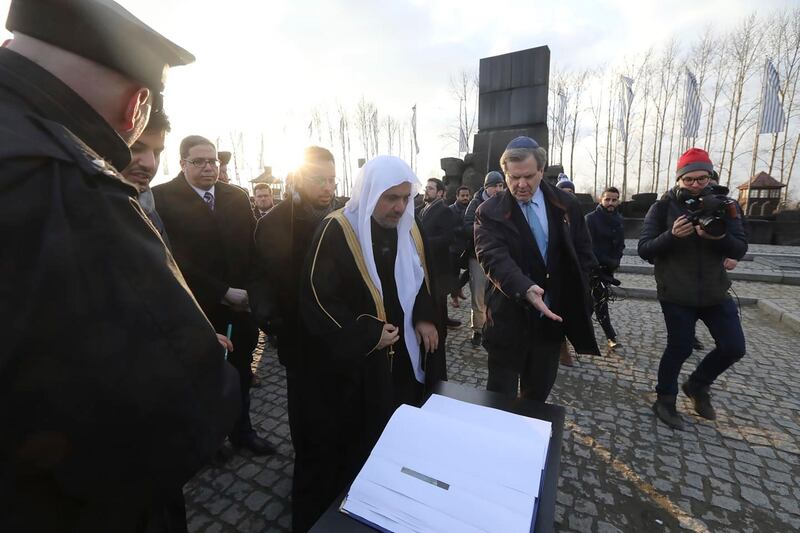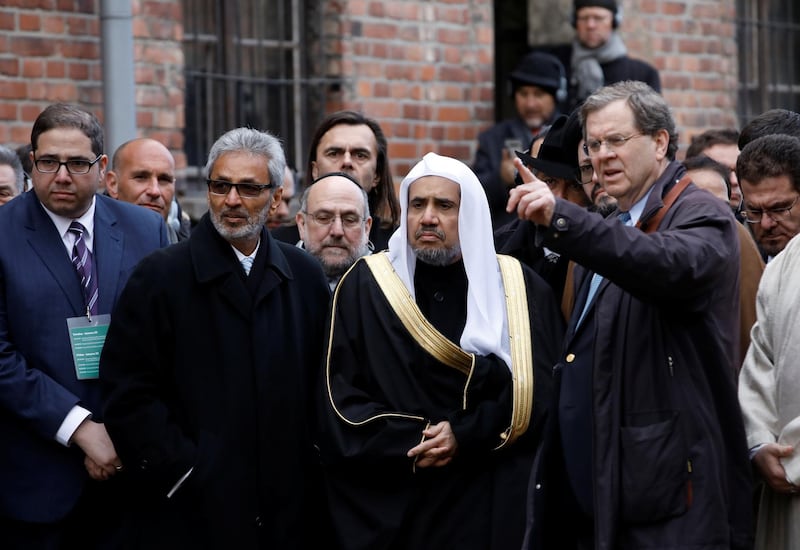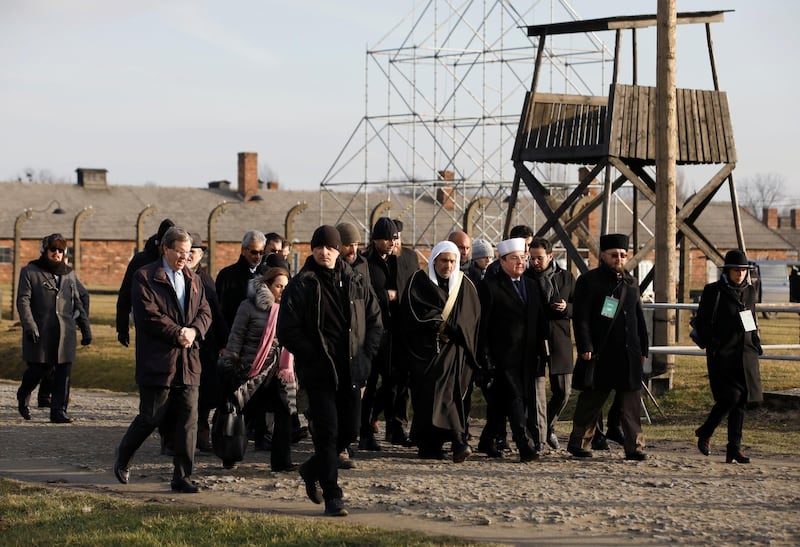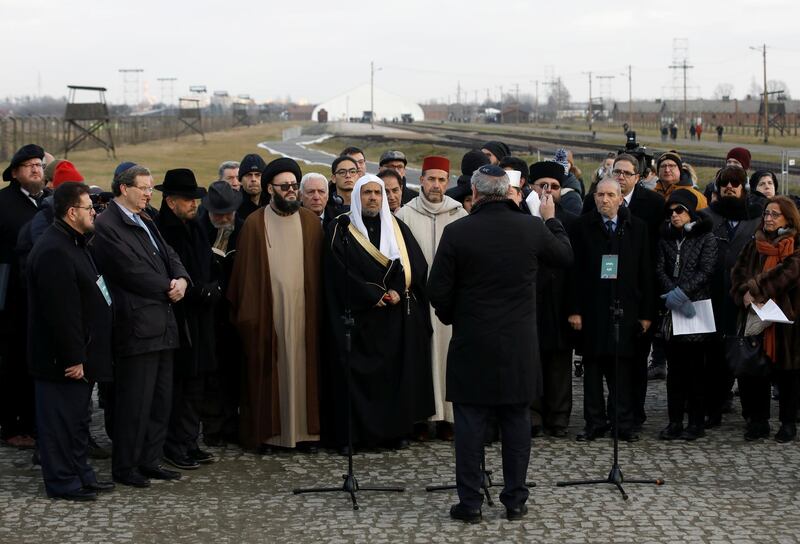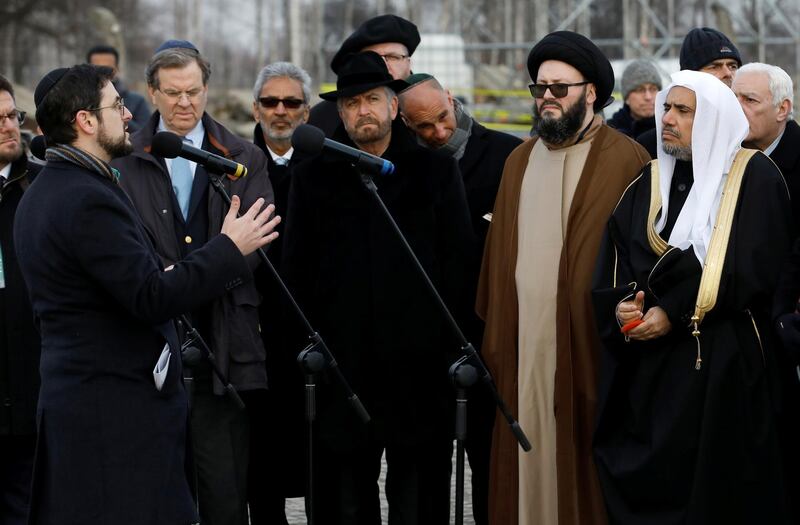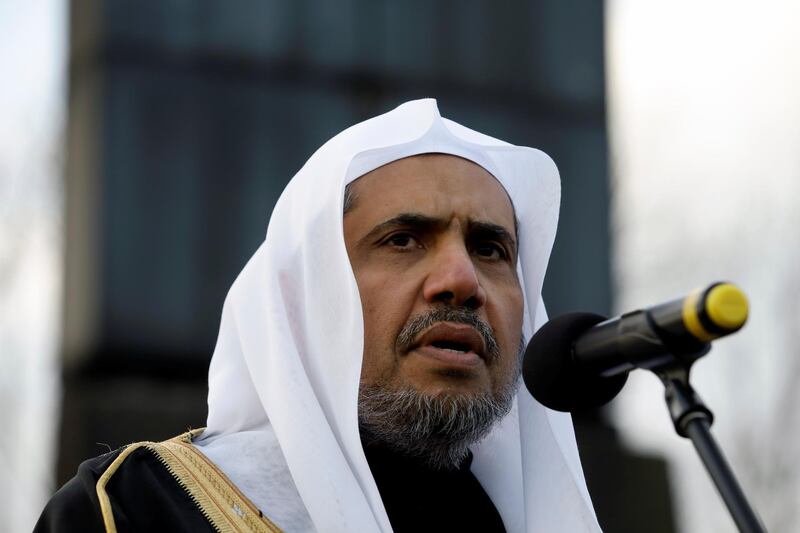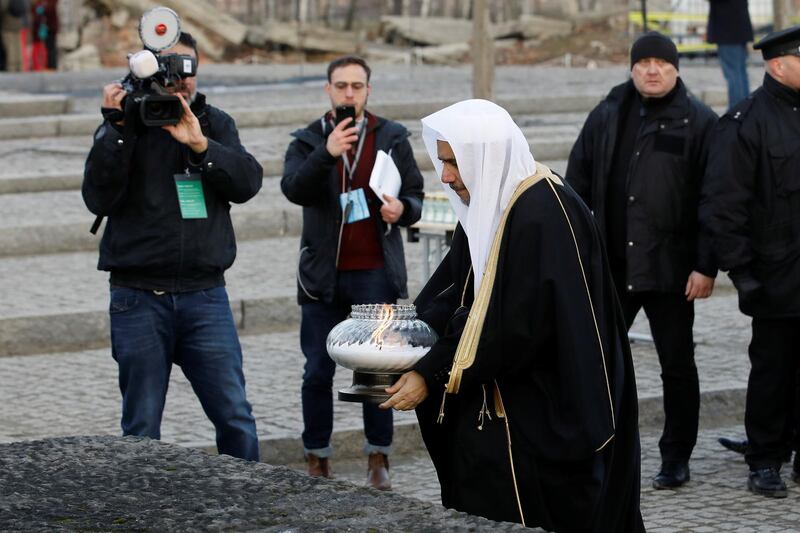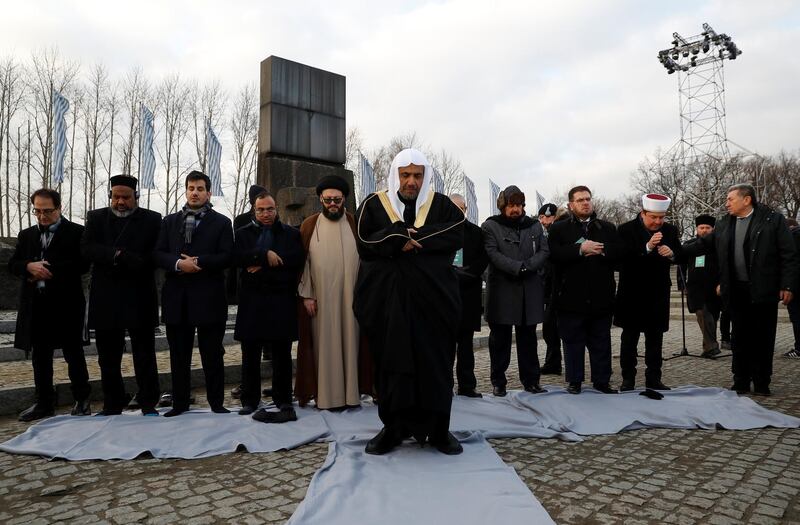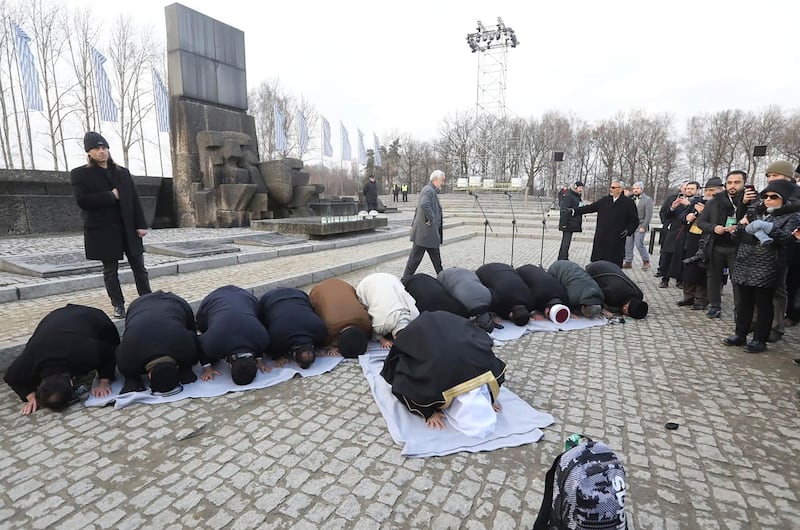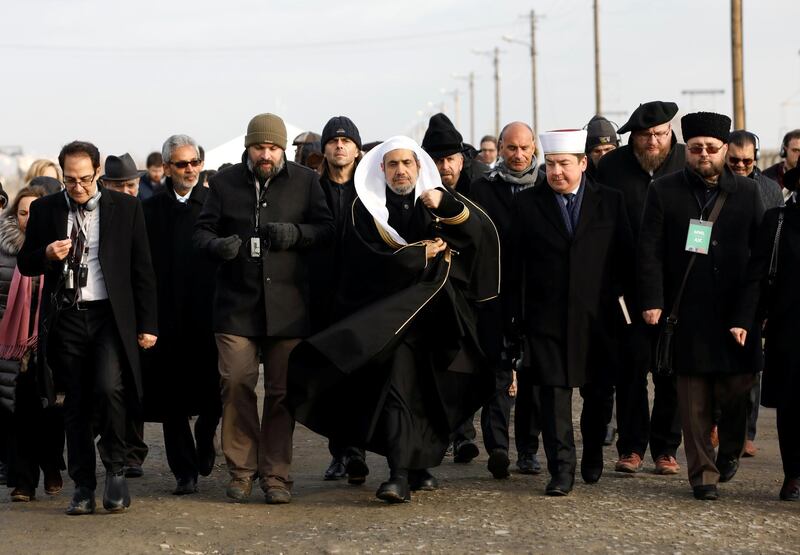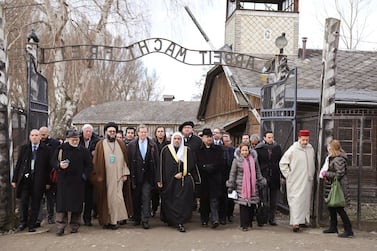Behind the international monument to the Holocaust at Auschwitz-Birkenau concentration camp birch trees and blue and white flags stretch towards the sky. The flags are flown in memory of the camp’s prisoners whose uniforms bore the same vertical striped pattern.
On a cold, clear January day the flags were the same colour as the sky. They were pulled by the breeze on a horizon otherwise marked by guard towers with pitched roofs and barbed wire fences. In the opposite direction stretched the train tracks which brought most of those prisoners to their deaths.
Of the more than 6 million Jews and millions of other victims killed during the Holocaust, in total 1.1 million lost their lives at Auschwitz during the Second World War. The death camp was built and operated by the Nazis during the German occupation of Poland.
Since it was liberated by the allies in 1945 the death camp, where the vast majority of those killed were European Jews, has been hallowed ground. This week, during commemorations across the globe for the 75th anniversary of that liberation, it was also a place of prayer for Muslims mourning the carnage of the Nazi genocide.
The symbolism of Muslim leaders – the most senior Islamic delegation to visit any Nazi death camp – praying at the Auschwitz monument can hardly be overstated. The visit by the interfaith Jewish and Muslim delegation from the Muslim World League (MWL) and the American Jewish Committee (AJC) was agreed to in April 2019. In total, a year and a half of negotiations were needed behind the scenes before the visit was secured.
Before he led the salah prayers, the secretary general of the MWL Sheikh Mohammad Al Issa told The National his group, which included both Sunni and Shiite clerics, stood vehemently against the crimes perpetrated at Auschwitz.
“We came to say that the Islamic religion deplores these crimes,” he said. “This visit is important, it expresses the Islamic feeling towards these crimes, these racial, genocidal crimes.
“Islam doesn’t have double standard, as it stands with justice against any crime that violates the sanctity of human kind,” the Saudi religious leader said.
Jewish members of the interfaith delegation, which included rabbis and children of Holocaust survivors, also gave blessings at site of the international memorial. AJC chief executive David Harris spoke with emotion of the importance of the visit.
“I am sure all of us were moved profoundly by the prayer we just witnessed,” Mr Harris said, as he called for peace.
“God gave us mercy, God gave us compassion. Auschwitz is a betrayal of God,” he said. “I cry out for peace.”
The members of the delegation were confronted during their visit by the full horror of Auschwitz, the expansive scale of the industrialised killing and personal tales of tragedy and heroism.
Sheikh Al Issa was visibly moved when he was shown the mounds of human hair and the shoes of the victims collected at Auschwitz. The delegation was shown more and more incontrovertible evidence of the mass murder that took place there. Piles of discarded Zyklon B canisters, which contained the chemical used in the gas chambers, were on display. Their commercial orange packaging still bears the skull and crossed-bones even a child knows warns of poison.
The delegation was shown the spot where SS guards at the camp selected those who would be sent to work and those who would be sent to the gas chambers to die. Poland’s chief rabbi, Michael Shudrich, told Sheikh Al Issa they were standing at the place his uncle had seen his mother for the last time. The rabbi’s great aunt told her son to keep his hair out of his eyes. She is likely to have been killed later that same day.
"Six million Jews is an abstract number but one mother telling her son to push his hair out of his eyes – that's something that means something to everyone," Mr Shudrich told The National.
The stories of non-Jewish victims of the Holocaust were also shared, including the history of those Muslims at Auschwitz. Many Muslims killed in the death camps came from the eastern parts of the Soviet Union but the delegation was also told of Ali Ben Ali Mohammed, a North African Muslim transported to work in the slave labour camps by a French company. His name was preserved in the meticulous records kept by the Nazis.
The day following the visit to Auschwitz, a Friday, which is holy to both Muslims and Jews, the interfaith delegation celebrated the life of their respective religious cultures in Poland.
Jews and Muslims prayed together at Jummah prayers at the Tatarska Street Mosque by the Tartar cemetery in the north west of Warsaw. The sermon there called for understanding between neighbours. The Muslim community in Poland is centuries old. The grave stones to Tartar officers in the cemetery, written in Cyrillic and Arabic, date back to the 19th century.
After Muslim prayers the delegation went to Warsaw’s only remaining pre-war synagogue, the Nozyk Synagogue in the centre of the polish capital, before a Friday Shabbat service. The Jewish temple stood in what was the Warsaw Ghetto, where nearly half a million Jews were imprisoned during World War Two. Most held there were sent to the gas chambers, killed during the ghetto uprising or died of starvation.
The day concluded with a Shabbat dinner, held at Warsaw’s Royal Palace. The Speaker of the Polish Senate, Poland’s Minister of Foreign Affairs Jacek Czaputowicz, and members of the Polish Catholic clergy were in attendance.
“Our 21st century challenge at AJC is to write a new chapter between the Muslim and Jewish peoples,” Mr Harris said on Friday, remarking that great strides had been made to resolve the differences between the Christian and Jewish communities which had been so devastating in the 20th Century.
Sheikh Al Issa’s rhetoric had become more forthright following his visit to the extermination camps. “We condemn the horrific acts that took place at Auschwitz against the Jews. It is a stain on humanity,” he said. “The evidence we saw yesterday shook us all. It was so painful for me looking at human hair, at children’s shoes, at so much more evidence of the atrocity.”
Skeikh Al Issa called those who engage in Holocaust denial partners in the crime. "They are like Nazis themselves,” he said.
